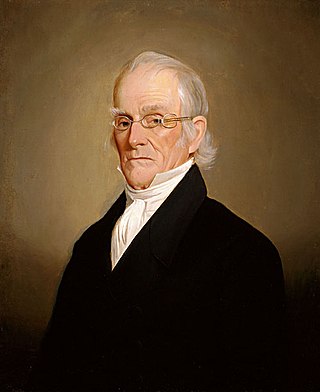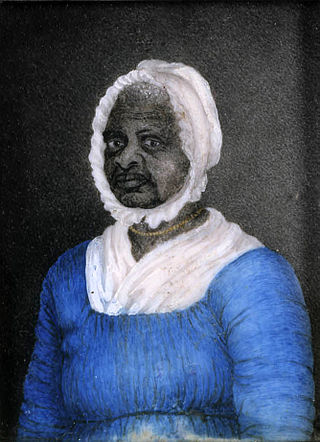Nathaniel Booth may refer to:
- Nathaniel Booth, 4th Baron Delamer (1709–1770), English peer
- Nathaniel Booth (slave) (1826–1901), escaped African-American slave
Nathaniel Booth may refer to:

John Wilkes Booth was an American stage actor who assassinated United States President Abraham Lincoln at Ford's Theatre in Washington, D.C., on April 14, 1865. A member of the prominent 19th-century Booth theatrical family from Maryland, he was a noted actor who was also a Confederate sympathizer; denouncing President Lincoln, he lamented the recent abolition of slavery in the United States.

Samuel Alexander Mudd Sr. was an American physician who was imprisoned for conspiring with John Wilkes Booth concerning the assassination of Abraham Lincoln.

Nathaniel Macon was an American politician who represented North Carolina in both houses of Congress. He was the fifth speaker of the House, serving from 1801 to 1807. He was a member of the United States House of Representatives from 1791 to 1815 and a member of the United States Senate from 1815 to 1828. He opposed ratification of the United States Constitution and the Federalist economic policies of Alexander Hamilton. From 1826 to 1827, he served as President pro tempore of the United States Senate. Thomas Jefferson dubbed him "Ultimas Romanorum"—"the last of the Romans", like Flavius Aetius.

Nathaniel Rochester was an American Revolutionary War soldier, and land speculator, most noted for founding the settlement which would become Rochester, New York.

Nathaniel Gordon was the only slave trader in the U.S. to be tried, convicted, and executed for having "engaged in the slave trade," under the Piracy Law of 1820.

Elizabeth Freeman, also known as Bet, Mum Bett, or MumBet, was the first enslaved African American to file and win a freedom suit in Massachusetts. The Massachusetts Supreme Judicial Court ruling, in Freeman's favor, found slavery to be inconsistent with the 1780 Massachusetts State Constitution. Her suit, Brom and Bett v. Ashley (1781), was cited in the Massachusetts Supreme Judicial Court appellate review of Quock Walker's freedom suit. When the court upheld Walker's freedom under the state's constitution, the ruling was considered to have implicitly ended slavery in Massachusetts.
Any time, any time while I was a slave, if one minute's freedom had been offered to me, and I had been told I must die at the end of that minute, I would have taken it—just to stand one minute on God's airth [sic] a free woman— I would.

Carter's Grove, also known as Carter's Grove Plantation, is a 750-acre (300 ha) plantation located on the north shore of the James River in the Grove Community of southeastern James City County in the Virginia Peninsula area of the Hampton Roads region of Virginia in the United States.
Booth is a surname of northern English and Scottish origin, but arguably of pre 7th century Norse-Viking origins. It is or rather was, topographical, and described a person who lived in a small barn or bothy. Derived from the word "both", the word was used to denote various kinds of shelter, but especially a herdsman's dwelling on a summer pasture. The surname is most popular in Northern England, where early Scandinavian influence was marked, and to some extent in Scotland.

Sonnet 57 is one of 154 sonnets written by the English playwright and poet William Shakespeare. It is a member of the Fair Youth sequence, in which the poet expresses his love towards a young man. Sonnet 57 is connected with Sonnet 58 which pursues the theme of the poet as a slave of the beloved.
George Booth was an English pirate who was active in the Indian Ocean and the Red Sea. Counted among his crew were several pirates who would later become prominent captains including Nathaniel North, Thomas Howard and Booth's eventual successor, John Bowen.
Ben or Benjamin Smith may refer to:

Nathaniel Peabody Rogers was an American attorney turned abolitionist writer, who served, from June 1838 until June 1846, as editor of the New England anti-slavery newspaper Herald of Freedom. He was also an activist for temperence, women's rights, and animal rights.

John Bowen was a pirate of Créole origin active during the Golden Age of Piracy. He sailed with other famous contemporaries, including Nathaniel North and George Booth, who was his captain when he was a crewman aboard the Speaker. Over a four-year period, Bowen took about £170,000 in goods and coinage and retired to Bourbon for a brief period of time before his death in 1704.

An Act to protect the commerce of the United States and punish the crime of piracy is an 1819 United States federal statute against piracy, amended in 1820 to declare participating in the slave trade or robbing a ship to be piracy as well. The last execution for piracy in the United States was of slave trader Nathaniel Gordon in 1862 in New York, under the amended act.
Nathan Green may refer to:

Abram Daniel Smith, often abbreviated A. D. Smith, was an American lawyer, politician, and pioneer. As a leader of the Hunters' Lodges, he was elected President of the Republic of Canada in the midst of the Canadian Rebellions of 1837–1838. Later, he became a prominent lawyer in the Wisconsin Territory, and was one of the first justices of the Wisconsin Supreme Court, where he authored a major opinion against the Fugitive Slave Act of 1850.

John ColvinKnox was a Pennsylvania lawyer and judge. He served as an associate justice of the state Supreme Court and a term as state Attorney General.
Nathaniel Booth was an African American who escaped from slavery.
Mary Black was a slave of African descent in the household of Nathaniel Putnam of the Putnam family who was accused of witchcraft during the Salem witch trials. Nathaniel's nephew was Thomas Putnam, one of the primary accusers, though Nathaniel himself was skeptical and even defended Rebecca Nurse. Mary was arrested, indicted, and imprisoned, but did not go to trial, and was released by proclamation on January 21, 1693 [O.S. January 11, 1692]. She returned to Nathaniel's household after she was released, another indication of Nathaniel's view of the charges against her.
Thomas White was an English pirate active in the Caribbean and the Indian Ocean. He was only briefly a captain on his own but served under several more prominent captains such as George Booth, John Bowen, Thomas Howard, John Halsey, and Nathaniel North.